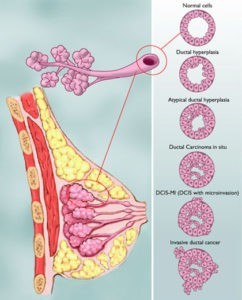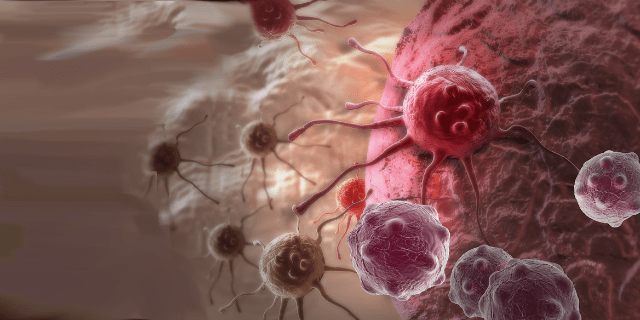We reviewed randomized trials of neoadjuvant and adjuvant chemotherapy and noted that insufficient evidence is available to support or withhold use of chemotherapy in patients with invasive lobular breast cancer-
This article deals with the fact that, although there is little data suggesting that lobular and ductal breast cancers respond in similar ways to primary systemic chemotherapy, they are usually treated the same way. They believe that the benefit for those with lobular breast cancer is unclear and that more study is needed.
They conclude the following: “In view of the paucity of data on the specific role of chemotherapy for patients with invasive lobular carcinoma, the possible role of histology as a marker of tumour biology and treatment effectiveness, and the potential practical implications of cost and of short-term and long-term toxic effects of chemotherapy, we suggest that the role of histology should be more thoroughly investigated in future randomised trials, so that possible overtreatment of patients with invasive lobular carcinoma can be avoided.”

Since most trials of neoadjuvant therapy report clinical or pathological response rates, or both, the role of chemotherapy in invasive lobular carcinoma could be assessed prospectively in such randomised trials by at least two different approaches: by comparing response rates to chemotherapy between patients with invasive ductal carcinoma and those with invasive lobular tumours; and by comparing the response rate of invasive lobular cancers with chemotherapy and with hormone treatment.
In addition to the experimental setting, the role of histology could also be investigated by retrospective analysis of individual data from patients enrolled in previous randomized trials.
Finally, besides the potential implications of our findings on future retrospective and prospective research, we suggest that treatment guidelines should reconsider current evidence about the role of chemotherapy in patients with early-stage invasive lobular carcinoma.
Women with classic invasive lobular carcinoma represent a more homogeneous population—eg, with almost universal estrogen-receptor expression and frequent display of lower histological grade and proliferation index—than patients with invasive ductal carcinoma, who encompass various subgroups of expression of hormone receptors, ERBB2, and other prognostic features.”
Mary Miller Breast Cancer Profile in Courage
“Invasive lobular carcinoma is the second most frequent histological type of breast cancer and its incidence is increasing. It has unique clinical, biological, and molecular features. Invasive lobular carcinoma is almost invariably positive for the estrogen receptor and, when compared with invasive ductal carcinoma, it is typically of a lower grade.
Even though invasive lobular carcinoma represents a distinct clinical entity, the same criteria used for invasive ductal carcinoma are currently applied to establish the need for primary or adjuvant systemic chemotherapy.
We reviewed randomized trials of neoadjuvant and adjuvant chemotherapy and noted that insufficient evidence is available to support or withhold use of chemotherapy in patients with invasive lobular carcinoma. Thus, the benefit from systemic chemotherapy for individuals with this form of breast disease is unclear. Invasive lobular carcinoma deserves to be investigated separately in prospective clinical trials to define the best treatment and prevention strategies.
PMID: 17196511 [PubMed – indexed for MEDLINE]




